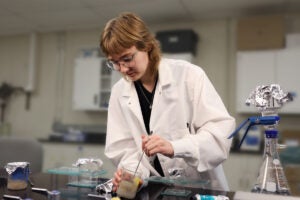When Devin Matthews first walked into Professor John Stanton’s office, Stanton appraised him as a pretty typical first-year student. Matthews had a scruffy beard, a self-effacing manner and a high school transcript that placed him somewhere in the middle of the pack of his Tulsa, Okla., high school class.
Matthews had wanted to meet with Stanton because he was interested in taking his upper-division course in quantum mechanics and spectroscopy. The two talked for a while, and Stanton agreed to let him enroll. Then, Stanton said, he expected Matthews to go on his way. Instead, Matthews kept sitting in Stanton’s office, finally hinting that he had more than a typical interest in the field of quantum chemistry. Stanton began to quiz him on what he knew and was pretty quickly blown away.
“There are moments in life when you realize that nothing will ever be the same again,” said Stanton, the George W. Watt Centennial Professor of chemistry and biochemistry. “This was one of them.”
Matthews already knew more about quantum chemistry than many first-year graduate students. He’d already written quantum chemistry software that was considerably more complex than what Stanton himself had written as a college senior. And he’d done it all on his own, without any quantum chemists to mentor him, because at the age of 15 he’d become captivated by the Schrödinger equation, which is one of the foundational equations of quantum mechanics.
“It’s such a beautiful equation,” said Matthews, who’s graduating with a Dean’s Scholars degree in chemistry. “It has this great symmetry and simplicity. Once you start working with it, it gets really complicated, of course, but even then, when you focus in on each part of it, it makes sense in terms of what it’s describing in real life.”
Matthews’ next step will be to stay in place, for a little while. This summer he’ll officially enroll at The University of Texas at Austin as a graduate student. He contemplated going elsewhere for his doctor’s degree, but decided to stay in Austin for a few reasons. He likes the work he’s doing in Stanton’s lab, he’ll have a head start on his thesis, and with Stanton’s support he’ll be able to finish more quickly than he might at another school.
“It doesn’t make sense for him to spend six years in a graduate program somewhere else,” Stanton said. “I want to get him on to the next step.”
Read the complete story on the College of Natural Sciences Web site.



